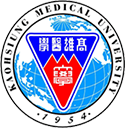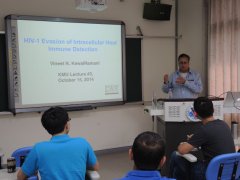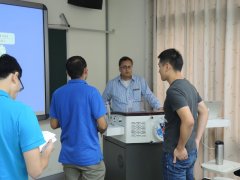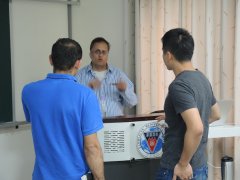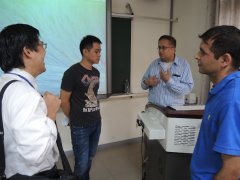- Participant: Teachers and students in Kaohsiung Medical University
- Instructor: Vineet N. KewalRamani (HIV Drug Resistance Program Senior Investigator, U.S. National Cancer Institute)
-
Date Time Place Subject 10/15 (Wednesday) 8:00~12:00 IR203 2F., International Academic Research Building HIV-1 Capsid Shields Viral DNA from the Cytosolic DNA Sensor cGAS (1) 10/15 (Wednesday) 14:00~17:00 IR203 2F., International Academic Research Building HIV-1 Capsid Shields Viral DNA from the Cytosolic DNA Sensor cGAS (2) - Course Outline
Retroviruses must replicate their genomes in the presence of cytosolic DNA sensors capable of triggering an antiviral response. Here we demonstrate that HIV-1 reverse transcribed DNA products are shielded from cytosolic DNA sensors by the HIV-1 core. Treatment of HIV-1 infected cells with the capsid-binding drug PF-3450074 releases DNA products into the cytosol where they can stimulate the cGAS-STING pathway and produce a type I IFN response. HIV-1 coordinates reverse transcription and uncoating to minimize exposure of DNA products, and perturbation of either process can influence the ability of HIV-1 to induce a type I IFN response. Furthermore, we demonstrate that the N74D mutation in the viral capsid, which is detrimental to reverse transcription in primary macrophages, can be rescued by destabilizing the viral core. Both wild-type and N74D HIV-1 stimulate an antiviral response in macrophages that is dependent on viral DNA synthesis and impedes subsequent rounds of virus infection. Collectively, these results illustrate the interdependence of reverse transcription and uncoating, and the importance of coordinating these two viral activities to avoid immune stimulation.
Organized by K.M.U. Department of Medical Laboratory Science and Biotechnology
Co-Organized by K.M.U Center for Infectious Disease and Cancer Research
[IC-CT] 2014 HIV-1 Capsid Shield
國際化交流 International Collaboration 協同教學 Collaborative Teaching 2014 HIV-1 Capsid Shields Viral DNA from the Cytosolic DNA Sensor cGAS
20141015_HIV-1_Capsid_Shields_Viral_DNA_from_the_Cytosolic_DNA_Sensor_cGAS_4.jpg
20141015_HIV-1_Capsid_Shields_Viral_DNA_from_the_Cytosolic_DNA_Sensor_cGAS_3.jpg
20141015_HIV-1_Capsid_Shields_Viral_DNA_from_the_Cytosolic_DNA_Sensor_cGAS_2.jpg
20141015_HIV-1_Capsid_Shields_Viral_DNA_from_the_Cytosolic_DNA_Sensor_cGAS_1.jpg
